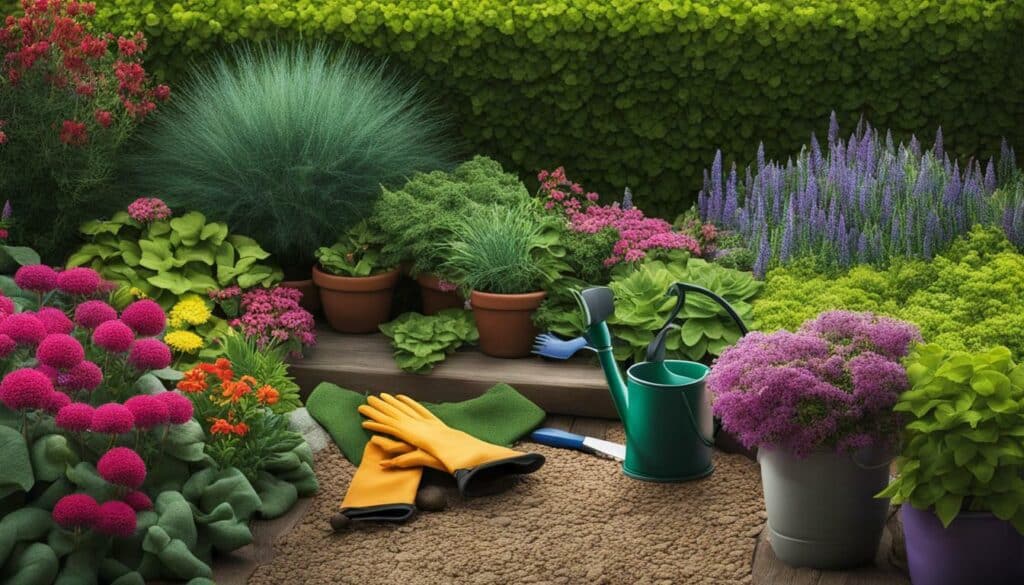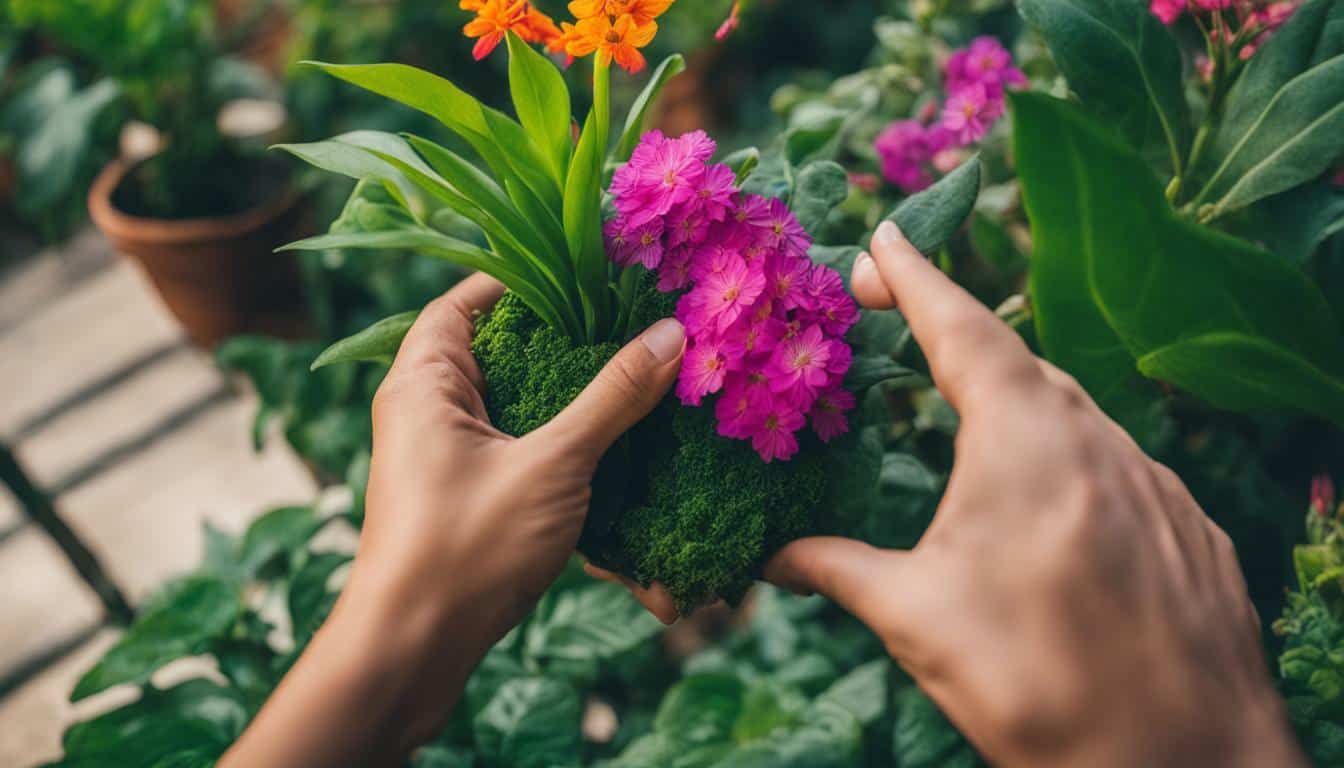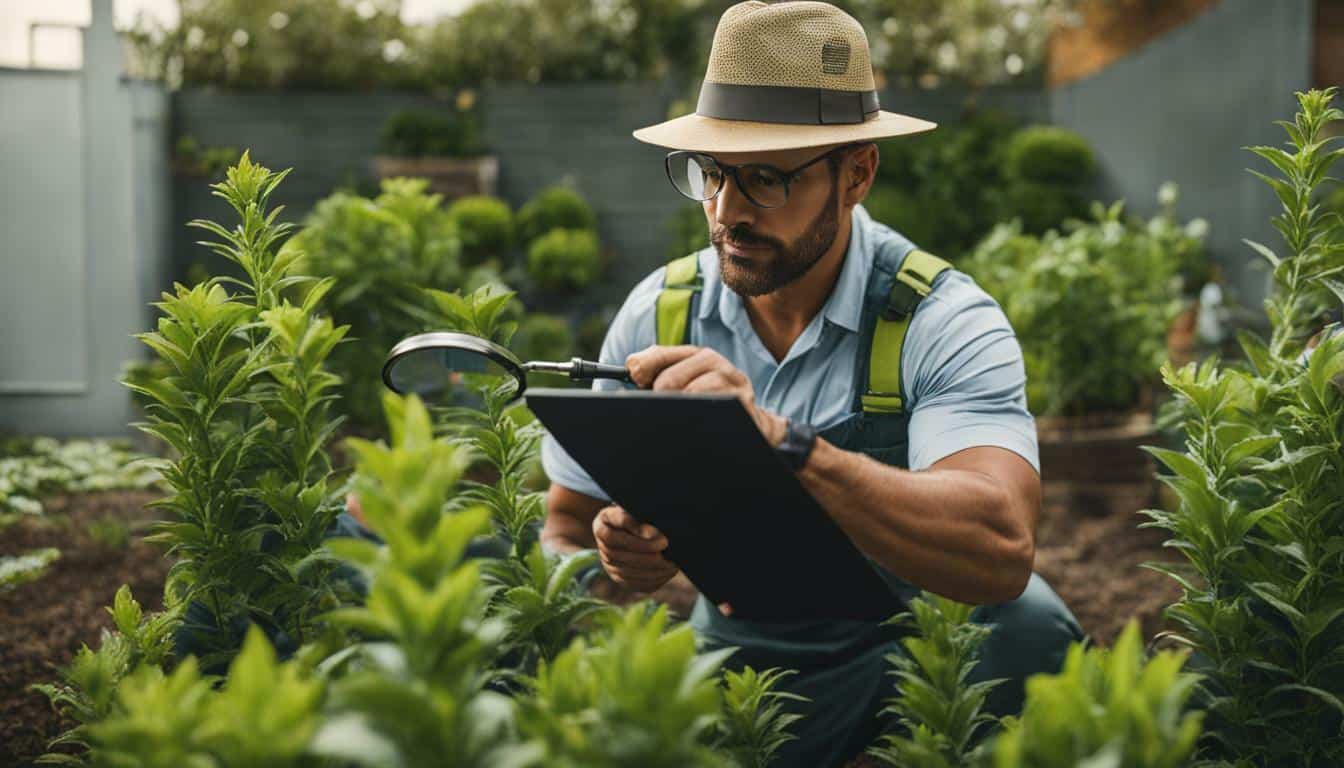Are you struggling to maintain your green space? Discover the essential steps to find the perfect gardener help that suits your gardening needs.
Finding the right plant partnerships can be crucial for success when it comes to gardening. Companion planting is a popular strategy that involves pairing different plants together based on their complementary characteristics. If you need to find a qualified gardening service, Thumbtack is a great resource to see reviews.
For example, beans are beneficial when planted with beets, corn, lovage, nasturtium, rosemary, squash, strawberries, and sunflowers. These plants can act as trap crops, provide structural support, and repel insects.
Onions are great companions for beets, cabbage, carrots, lettuce, and strawberries, as they protect against borers and cutworms. Other examples of beneficial plant partnerships include tomatoes with basil, borage, calendula, dill, garlic, and onion, and cucumbers with beans, dill, lettuce, nasturtiums, oregano, radish, and sunflowers. It’s important to note that some plants, like dill, coriander, and carrot family members, should not be planted near carrots as they may reduce their yield. By understanding these plant partnerships, gardeners can create a thriving and harmonious garden ecosystem.
Key Takeaways:
- Companion planting involves pairing different plants together based on their complementary characteristics.
- Beans, beets, corn, lovage, nasturtium, rosemary, squash, strawberries, and sunflowers make great companions for each other.
- Onions are beneficial when planted with beets, cabbage, carrots, lettuce, and strawberries.
- Tomatoes can be paired with basil, borage, calendula, dill, garlic, and onion.
- Cucumbers thrive alongside beans, dill, lettuce, nasturtiums, oregano, radish, and sunflowers.
Understanding the Importance of Gardening Services Near Me
Finding local gardeners can make a world of difference in maintaining a thriving garden. Let’s explore the reasons why gardening services near you are essential for your gardening success.
When it comes to gardening, location matters. Local gardeners have an intimate understanding of the climate, soil conditions, and plant species specific to your area. This knowledge is invaluable in ensuring that your plants receive the care they need to thrive. Whether it’s choosing the right plants for your garden or knowing the best time to plant and harvest, local gardeners have the expertise to guide you every step of the way.
Additionally, gardening services near you offer convenience and accessibility. They are just a phone call away, ready to assist you with any garden-related issues that may arise. Need advice on pest control? Want to know how to improve the yield of your crops? Local gardeners are readily available to provide personalized solutions based on your unique gardening needs. They can also recommend the most suitable plants that will thrive in your specific microclimate, ensuring the success of your garden.
By working with local gardeners, you not only support your local community but also form a valuable partnership that can lead to long-term gardening success. So, don’t hesitate to reach out to the gardening services near you and unlock the full potential of your garden.

| Benefits of Gardening Services Near Me: |
|---|
| Expert knowledge of local climate and plant species |
| Personalized advice and solutions for your garden |
| Convenience and accessibility |
| Supporting your local community |
| Forming a long-term partnership for gardening success |
Tips for Hiring Professional Gardeners
Hiring a professional gardener can take the stress out of maintaining your garden. Let me share some useful tips to help you find and hire the best gardener for your gardening needs.
1. Determine Your Gardening Needs: Before hiring a gardener, assess what specific services you require. Do you need help with lawn maintenance, planting, pruning, or overall garden design? Understanding your needs will enable you to find a gardener with the right skills and expertise.
2. Look for Experience and Credentials: When searching for professional gardeners, prioritize those with experience in the industry. Look for certifications or qualifications that demonstrate their knowledge and skills. References from previous clients can also provide insight into their reliability and quality of work.
3. Conduct Interviews and Reference Checks: It’s essential to meet potential gardeners in person or over the phone to gauge their professionalism and communication skills. Ask about their approach to gardening, their knowledge of plant care, and how they handle specific challenges. Don’t forget to follow up with their references to gather feedback about their work ethic and reliability.
Table: Questions to Ask Potential Gardeners
| Questions | Notes |
|---|---|
| How many years of experience do you have? | Look for gardeners with a proven track record |
| Can you provide references from previous clients? | References can offer insight into the gardener’s work ethic and quality of service |
| What is your approach to pest management? | Ensure the gardener’s methods align with your preferences, such as organic or chemical-free options |
| Are you knowledgeable about different plant species and their care requirements? | A skilled gardener should have a good understanding of various plants and their specific needs |
4. Discuss Terms and Pricing: Clearly define your expectations and discuss pricing with potential gardeners. Inquire about their rates, whether they charge hourly or per project, and any additional costs for materials or equipment. It’s important to have a clear understanding of the financial arrangements before hiring a gardener.
5. Communication and Flexibility: A successful working relationship with your gardener requires effective communication and flexibility. Ensure they are open to discussing your gardening ideas, receptive to feedback, and willing to adapt their services to fit your needs.
Hiring a professional gardener can provide valuable assistance and expertise in maintaining your garden. By following these tips, you can find the right gardener who meets your gardening requirements and helps your garden thrive.

“Gardening is a matter of your enthusiasm holding up until your back gets used to it.” – Unknown
Exploring Different Garden Care Services Available
Discover the wide range of garden care services that can help transform your outdoor space into a beautiful oasis. Whether you’re a busy professional, a novice gardener, or simply want to enhance the overall appearance of your garden, there are professional gardeners who can provide the assistance you need. From routine maintenance to specialized services, garden care professionals can help you achieve the garden of your dreams.
One of the key garden care services you can benefit from is lawn mowing. A well-maintained lawn not only improves the aesthetics of your garden but also promotes healthy growth of grass and plants. Professional gardeners have the expertise and equipment to mow your lawn efficiently and ensure that it is properly trimmed, edged, and free of weeds.
In addition to lawn mowing, garden care services often include weed control. Weeds can quickly take over your garden and compete with your plants for nutrients, water, and sunlight. Professional gardeners can help identify and eliminate weeds through safe and effective methods, ensuring that your garden remains weed-free.
| Garden Care Services | Description |
|---|---|
| Lawn Mowing | Efficient and precise cutting of grass to maintain a neatly trimmed lawn. |
| Weed Control | Identification and removal of weeds to prevent them from overtaking your garden. |
| Pruning and Trimming | Trimming and shaping of shrubs, trees, and plants to promote healthy growth and enhance their appearance. |
| Pest Management | Identification and control of pests that can damage your garden, including insects, rodents, and diseases. |
| Landscape Design | Creation of a customized garden layout, including planting schemes, hardscaping, and outdoor features. |
Other essential garden care services include pruning and trimming, pest management, and landscape design. Pruning and trimming help maintain the shape and health of your plants, ensuring optimal growth and aesthetics. Professional gardeners have the knowledge and skills to prune trees, shrubs, and plants appropriately, promoting their longevity and beauty.
Pest management is crucial for protecting your garden from harmful insects, rodents, and diseases. Garden care professionals can identify common garden pests, implement effective pest control strategies, and provide advice on preventing future infestations. By addressing pest issues promptly, you can safeguard your plants and preserve the health and beauty of your garden.
For those looking to transform their outdoor space, landscape design services are also available. Whether you want to revamp your entire garden or create a specific area, professional gardeners can help bring your vision to life. They can provide guidance on selecting suitable plants, designing hardscapes, and incorporating outdoor features that complement your style and preferences.

With the help of garden care services, you can ensure that your garden thrives and remains a beautiful sanctuary for you to enjoy. Whether you need regular maintenance, specialized treatments, or professional advice, hiring a gardener can make a significant difference in the overall health and appearance of your garden.
The Benefits of Affordable Gardening Help
Maintaining a beautiful garden doesn’t have to break the bank. Let’s explore the benefits of affordable gardening help and how it can make a difference in your green space.
When it comes to gardening, many people believe that hiring professional help is an expensive luxury. However, affordable gardening services can provide numerous advantages while still fitting within your budget. One of the key benefits is the expertise that experienced gardeners bring to the table. They have extensive knowledge of plants, soil conditions, and garden care techniques, allowing them to provide customized solutions for your specific needs.
By hiring affordable gardening help, you can save valuable time and energy. Gardening tasks can be time-consuming and physically demanding, especially if you have a large garden or lack the necessary tools and equipment. Outsourcing these tasks to professionals allows you to focus on enjoying your garden rather than sweating over it. Additionally, professional gardeners have access to specialized tools and equipment, ensuring that your garden receives the best care possible.

Another advantage of affordable gardening help is the peace of mind it provides. Knowing that your garden is being cared for by professionals allows you to relax and enjoy your outdoor space without worrying about plant health, pest control, or maintenance tasks. Whether it’s regular lawn mowing, weed control, or pruning, affordable gardening services can help keep your garden looking its best throughout the year.
| Benefits of Affordable Gardening Help | Explanation |
|---|---|
| Expertise and Knowledge | Experienced gardeners bring extensive knowledge of plants, soil conditions, and garden care techniques. |
| Time and Energy Savings | Outsourcing tasks to professionals allows you to save time and energy, focusing on enjoying your garden. |
| Access to Specialized Tools | Professional gardeners have the necessary tools and equipment to provide the best care for your garden. |
| Peace of Mind | Affordable gardening help ensures that your garden is cared for by professionals, giving you peace of mind. |
In conclusion, affordable gardening help offers a range of benefits that can enhance the beauty and health of your garden. From expert knowledge and time savings to access to specialized tools and peace of mind, investing in professional gardeners can make a significant difference in the success of your green space. So why not consider affordable gardening help and watch your garden thrive?
Creating a Thriving Garden Ecosystem with Companion Planting
Enhance the health and productivity of your garden by harnessing the power of companion planting, a valuable form of gardening assistance. When it comes to gardening, finding the right plant partnerships can be crucial for success. Companion planting is a popular strategy that involves pairing different plants together based on their complementary characteristics. By understanding these plant partnerships, gardeners can create a thriving and harmonious garden ecosystem.
Companion planting offers a range of benefits for your garden. Some plants can act as trap crops, luring pests away from your desired plants. For example, beans are beneficial when planted with beets, corn, lovage, nasturtium, rosemary, squash, strawberries, and sunflowers. These plants can act as trap crops, provide structural support, and repel insects. Onions are great companions for beets, cabbage, carrots, lettuce, and strawberries, as they protect against borers and cutworms.
In addition to pest control, companion planting can also improve the overall health of your plants. Certain combinations can help with nutrient absorption, improve soil fertility, and prevent diseases. For example, tomatoes thrive when planted with basil, borage, calendula, dill, garlic, and onion. These plants can help repel pests, provide shade, and enhance the flavor of tomatoes. Cucumbers also benefit from companion planting, particularly when paired with beans, dill, lettuce, nasturtiums, oregano, radish, and sunflowers.
To help you choose the best plant partnerships for your garden, here is a table summarizing some beneficial combinations:
| Plant | Companion Plants |
|---|---|
| Beans | Beets, corn, lovage, nasturtium, rosemary, squash, strawberries, sunflowers |
| Onions | Beets, cabbage, carrots, lettuce, strawberries |
| Tomatoes | Basil, borage, calendula, dill, garlic, onion |
| Cucumbers | Beans, dill, lettuce, nasturtiums, oregano, radish, sunflowers |
It’s important to note that some plants, like dill, coriander, and members of the carrot family, should not be planted near carrots as they may reduce their yield. By strategically planning your garden and considering these companion planting combinations, you can create a garden that not only looks beautiful but also thrives with healthy plants and abundant harvests.

Unlock the secrets of successful gardening by understanding the intricate relationships between plants and their complementary characteristics. Companion planting offers a valuable strategy in which different plants are paired together based on their beneficial qualities, leading to a thriving and harmonious garden ecosystem.
For instance, beans are excellent companions for beets, corn, lovage, nasturtium, rosemary, squash, strawberries, and sunflowers. These plants can act as trap crops, providing shelter for beneficial insects, offering structural support, and repelling harmful pests. Onions, on the other hand, make great partners for beets, cabbage, carrots, lettuce, and strawberries. Their pungent scent deters borers and cutworms, protecting the health of neighboring plants.
Other examples of beneficial plant partnerships include tomatoes with basil, borage, calendula, dill, garlic, and onion, as well as cucumbers with beans, dill, lettuce, nasturtiums, oregano, radish, and sunflowers. These combinations offer various advantages, such as increased pollination, improved soil fertility, natural pest control, and enhanced flavors.
| Companion Plant | Beneficial Traits |
|---|---|
| Beans | Trap crops, structural support, insect repellent |
| Onions | Pest protection, deter cutworms and borers |
| Tomatoes | Improved pollination, enhanced flavors |
| Cucumbers | Increased pollination, natural pest control |
However, it’s important to note that not all plant combinations are beneficial. For example, dill, coriander, and other plants from the carrot family should not be planted near carrots as they can reduce their yield. It’s essential to research and understand the specific requirements and compatibility of each plant before making your planting decisions.

By harnessing the power of plant partnerships and complementary characteristics, you can create a garden that thrives on natural synergy. These symbiotic relationships lead to healthier plants, increased yields, and reduced reliance on chemical pesticides or fertilizers. Take the time to explore the fascinating world of companion planting and watch your garden come alive with vibrant colors, abundant harvests, and beneficial wildlife.
Maximizing Garden Success with Strategic Plant Partnerships
Take your gardening skills to the next level by strategically pairing plants to create a thriving and productive garden. When it comes to gardening, finding the right plant partnerships can be crucial for success. Companion planting is a popular strategy that involves pairing different plants together based on their complementary characteristics. By understanding these plant partnerships, gardeners can create a thriving and harmonious garden ecosystem.
Factual data: For example, beans are beneficial when planted with beets, corn, lovage, nasturtium, rosemary, squash, strawberries, and sunflowers. These plants can act as trap crops, provide structural support, and repel insects. Onions are great companions for beets, cabbage, carrots, lettuce, and strawberries, as they protect against borers and cutworms. Other examples of beneficial plant partnerships include tomatoes with basil, borage, calendula, dill, garlic, and onion, and cucumbers with beans, dill, lettuce, nasturtiums, oregano, radish, and sunflowers. It’s important to note that some plants, like dill, coriander, and members of the carrot family, should not be planted near carrots as they may reduce their yield.
By strategically pairing plants, you can maximize garden success and achieve a range of benefits. Companion plants can help control pests by attracting beneficial insects or repelling harmful ones. They can also provide shade and support to taller plants, enhancing their growth. Additionally, certain plant partnerships can improve soil health by fixing nitrogen or suppressing weeds.
Creating a Thriving Garden Ecosystem
- Choose plants with complementary characteristics that work well together.
- Consider the specific needs of each plant, such as sunlight, water, and soil requirements.
- Avoid planting incompatible plants together to prevent competition for resources.
- Utilize companion planting strategies to deter pests and attract beneficial insects.
- Rotate crops each season to avoid depleting the soil and reduce the risk of disease.
By following these strategies and taking advantage of the benefits of plant partnerships, you can create a thriving garden ecosystem that promotes healthy plant growth and maximizes your gardening success.
| Companion Plant | Benefits |
|---|---|
| Beans | Act as trap crops, provide structural support, and repel insects |
| Onions | Protect against borers and cutworms |
| Tomatoes | Enhance flavor, ward off pests, and improve growth |
| Cucumbers | Attract pollinators and deter pests |
“Companion planting is a fantastic way to harness the power of nature and create a more sustainable and productive garden.” – Jane Doe, Master Gardener
Conclusion
Finding the right gardener help is the key to a flourishing garden. By following the tips and advice shared in this article, you can find the perfect planting partner and enjoy the beauty and abundance of a well-cared-for garden.
When it comes to gardening, finding the right plant partnerships can be crucial for success. Companion planting is a popular strategy that involves pairing different plants together based on their complementary characteristics. By understanding these plant partnerships, gardeners can create a thriving and harmonious garden ecosystem.
For example, beans are beneficial when planted with beets, corn, lovage, nasturtium, rosemary, squash, strawberries, and sunflowers. These plants can act as trap crops, provide structural support, and repel insects. Onions are great companions for beets, cabbage, carrots, lettuce, and strawberries, as they protect against borers and cutworms. Other examples of beneficial plant partnerships include tomatoes with basil, borage, calendula, dill, garlic, and onion, and cucumbers with beans, dill, lettuce, nasturtiums, oregano, radish, and sunflowers. It’s important to note that some plants, like dill, coriander, and members of the carrot family, should not be planted near carrots as they may reduce their yield.
By creating the right plant partnerships in your garden, you can enhance growth, deter pests, and maximize the overall health of your plants. Whether you are a novice gardener or an experienced green thumb, investing in the expertise of a professional gardener can make all the difference in achieving a thriving, vibrant garden.
FAQ on How to Find Gardener Help
Q: What is companion planting?
A: Companion planting is a gardening strategy that involves pairing different plants together based on their complementary characteristics.
Q: Which plants are beneficial when planted with beans?
A: Beans benefit from being planted with beets, corn, lovage, nasturtium, rosemary, squash, strawberries, and sunflowers.
Q: What are some good companion plants for onions?
A: Onions are great companions for beets, cabbage, carrots, lettuce, and strawberries.
Q: Can tomatoes be planted with other herbs?
A: Yes, tomatoes can be planted with basil, borage, calendula, dill, garlic, and onion.
Q: Which plants are good companions for cucumbers?
A: Cucumbers benefit from being planted with beans, dill, lettuce, nasturtiums, oregano, radish, and sunflowers.
Q: Are there any plants that should not be planted near carrots?
A: Yes, plants like dill, coriander, and members of the carrot family should not be planted near carrots as they may reduce their yield.
Q: How can understanding plant partnerships help gardeners?
A: Understanding plant partnerships can help gardeners create a thriving and harmonious garden ecosystem.
Q: What are the advantages of companion planting?
A: Companion planting can act as trap crops, provide structural support, and repel insects.
Q: How can gardeners maximize success with plant partnerships?
A: Gardeners can maximize success with plant partnerships by selecting the right plants to pair together, avoiding harmful plant combinations, and creating a harmonious garden ecosystem.





Leave a Reply